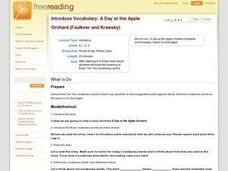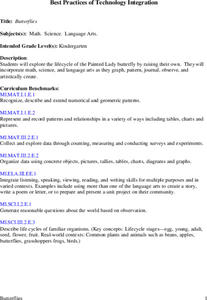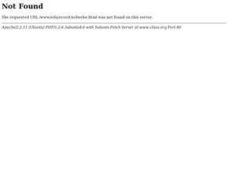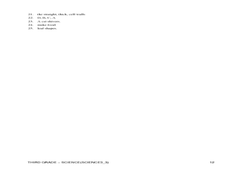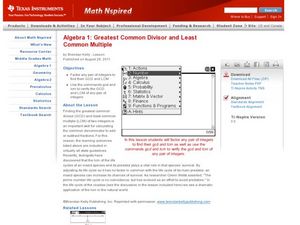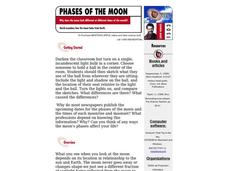Curated OER
From Seed to Apple
Learners identify the stages of apple growth. In this agricultural lesson, students read the story I Am Apple and sing the song "Round the Apple Tree." Learners place pictures of the stages of an apple into the correct order. Students...
Curated OER
Apples A"Peel" To Me
Second graders study the characteristics and uses for apples through this series of ten lessons. They look at the importance of apples in the US. They read literature about apples, graph, sort, and measure apples, and make apple snacks....
GiggleUp Kids
Happy Little Farmer
Pre-readers and primaries can help farmer rabbit to plant some delicious fruits and vegetables. From soil preparation and pest control, all the way to the harvest, little ones participate in the entire process!
Dr. Panda
Dr. Panda's Veggie Garden
Friends arrive at the farm and aspiring agronomists help the farmer to grow what the friends want. With adorable animation and charming background music, little ones practice virtual gardening and farming while developing cognitive...
Curated OER
Introduce Vocabulary: a Day at the Apple Orchard
Learners explore language arts by reading a story book in class. In this tier two vocabulary lesson, students read the book A Day at the Apple Orchard and identify the use of specific vocabulary words. Learners define the selected vocab...
Curated OER
"Honey Dew from Bunny Too!"
The students will design a lab to test the mechanism that triggers spore dispersal. They should have some clues after making observations of the life cycle. Part of the fun here is to let the students devise a method for testing this...
Curated OER
Butterflies
Students will explore the life cycle of the Painted Lady butterfly by raising their own. They will incorporate math, science, and language arts as they graph, pattern, journal, observe, and artistically create.
Curated OER
The Mechanisms of Decay and Decomposition
Eighth graders study how all living things die. They are introduced tot he life cycle and the concept of an ecosystem. Students have a introductory exposure to trophic levels (producer-consumer-decomposer) in the environment.
Curated OER
Pumpkin Pumpkin Activity Card
In this reading worksheet, students respond to the book Pumpkin Pumpkin by completing an activity at home with parents. Students cut apart 9 pictures that show the life cycle of a pumpkin and put them in sequential order.
Curated OER
Compost Columns
In this unit of lessons, young scholars examine the role of compost columns and recycling. They create a KWL chart about garbage in Chicago. They also examine life cycles and packaging of everyday products.
Curated OER
The Many, Varied, and Unusual Places and Things on Earth
Students discover how energy flows through communities because of the relationship between producers, consumers and decomposers. Examining various ecosystems, they identify the materials that cycle continuously through them. They label...
Curated OER
Using Electricity
Students name appliances that use electricity. They construct a simple electrical circuit. They predict whether a circuit work. They name components of an electrical circuit.
GP Strategies Corporation
Frog Dissection
One of the most common questions in a science classroom is, "Do we get to dissect anything?" With a fun and interactive experience, your eager biologists can perform a virtual dissection on a frog, as well as learn about different kinds...
Curated OER
Artha: Strategies for Survival, Success, and Power
Students explain the concept of artha, recognize strategies that allow states to survive and see how elements useful in political science can be applied to getting ahead in everyday life.
Curated OER
Organic and Inorganic Waste
Learners conduct a scientific investigation about organic or inorganic waste. In this organic or inorganic waste lesson, students create a compost heap to determine the difference between inorganic and organic waste. Learners...
California Academy of Science
Composting: A Scientific Investigation: California Academy of Sciences
Garbage, recycle, compost: Does it really matter where we put our trash once we are done? By making detailed observations over seven weeks, kids will see which materials break down naturally to become a healthy part of the soil, and...
Curated OER
Grade Three Science Practice
In this grade 3 science worksheet, 3rd graders complete a set of 25 multiple choice questions related to a variety of 3rd grade science concepts. An answer key is included.
Curated OER
Plants, Ecology, Seed Planting
First graders use senses to examine objective or events, then gather and interpret data with instruments. They design invention to support or refute hypothesis, then generate, record, and organize data. They improve environmental...
Texas Instruments
Greatest Common Divisor and Least Common Multiple
Students solve problems using the GCD and LCM. In this algebra instructional activity, students factor and simplify equations using the greatest common and least common factors and multiples. They factor integers in pairs.
Curated OER
Spelling Activity
Sometimes you can add an s to a word to form its plural. Sometimes you can't. Help your class learn how to pluralize irregular words like calf, woman, and half. After, have them study the prefixes un, de, pre, dis, and re in the colorful...
Curated OER
Books for Teaching About Colors
Young scholars explore colors through books. In this lesson students read books about colors. The lesson is divided by color and within each color there is a list of books about that color. Moreover each color section also includes an...
Curated OER
Stop the Bleeding
Students explore various parts of the heart and blood vessels . They begin with an overview of the components of the cardiovascular system. They see a cross section of an artery and watch how a blood clot develops.
Project SMART
Dinosaur Trek
Second graders investigate dinosaurs. They explore various websites, submit questions to a paleontologist online, construct cut and paste model dinosaur skeletons, develop a graph to compare dinosaurs, and label pictures from online...
Curated OER
Phases of the Moon
Students explore why when you examine the moon depends on its location in relationship to the sun and Earth. The moon never goes away or changes shape-we just see a different fraction of sunlight being reflected from the moon to Earth.






